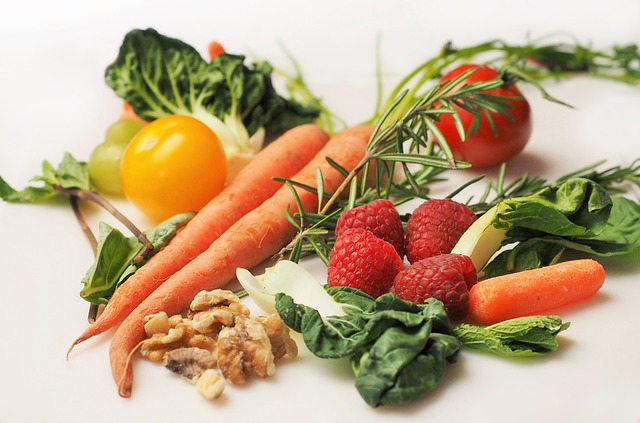
Foods That Support Optimal Eye Health
Are you concerned about maintaining good eye health? You’re not alone. Taking care of your eyes is crucial for overall well-being, and incorporating certain foods into your diet can significantly support optimal eye health.
By consuming foods that are rich in essential nutrients, such as omega-3 fatty acids, lutein, zeaxanthin, and vitamins A, C, and E, you can help prevent age-related macular degeneration, cataracts, and other eye problems.
Dark leafy greens like spinach and kale are some of the best foods for eye health. They contain high levels of lutein and zeaxanthin, which are antioxidants that help protect your eyes from harmful UV rays and blue light.
Additionally, omega-3 fatty acids found in fatty fish like salmon and tuna can also help prevent eye problems by reducing inflammation and improving blood flow to the eyes.
By incorporating these and other key nutrients into your diet, you can help ensure that your eyes stay healthy and strong for years to come. You should also get an annual eye exam from an eyecare provider like https://www.elitevisioncenters.com/.
Table of Content
Vitamins for Eye Health
If you want to keep your eyes healthy, you should make sure to eat foods rich in vitamins like C, E, and A. These vitamins can be found in various foods, including broccoli, Brussels sprouts, sunflower seeds, almonds, hazelnuts, peanuts, and peanut butter.
Vitamin C is important for the blood vessels in the eyes and can lower the risk of cataracts. Raw red peppers provide the most vitamin C per calorie, but citrus fruits like oranges and grapefruits are also good sources.
Vitamin E can help slow age-related macular degeneration (AMD) and prevent cataracts and can be found in sunflower seeds, almonds, hazelnuts, peanuts, and peanut butter.
Vitamin A, also known as beta-carotene, is important for night vision and can be found in orange-colored fruits and vegetables like sweet potatoes, carrots, cantaloupe, mangos, and apricots. Broccoli and Brussels sprouts are good sources of vitamins A, C, and E, which protect cells in the eyes from free radicals that break down healthy tissue.
Incorporating these foods into your diet can support optimal eye health and reduce your risk of developing eye diseases.
Dark Leafy Greens for Eye Health
You can easily incorporate dark, leafy greens into your diet to give your eyes the nutrients they need to stay healthy and prevent long-term diseases. Kale, spinach, and collard greens are all excellent sources of vitamins C and E, as well as carotenoids lutein and zeaxanthin. These nutrients can lower your risk of developing age-related macular degeneration (AMD) and cataracts.
Lutein and zeaxanthin are particularly important for eye health, as they block harmful blue light from damaging the retina and boost protective pigment in the macula. These nutrients can be found in squash, which is a year-round source of lutein and zeaxanthin. However, dark, leafy greens are also a great source of these nutrients.
In fact, consuming just 6mg of lutein and zeaxanthin per day can lower your risk of AMD by up to 43%. Incorporating dark, leafy greens into your diet is easy. You can add them to salads, smoothies, omelets, or sauté as a side dish. Aim for at least one serving per day to give your eyes the nutrients they need to stay healthy.
Incorporating dark, leafy greens into your diet can help prevent long-term eye diseases and keep your vision sharp.
Omega-3 Fatty Acids for Eye Health
Incorporating omega-3 fatty acids into your meals can help protect your vision from age-related macular degeneration (AMD) and glaucoma. These fatty acids are found in fatty fish like salmon, tuna, and trout. If you’re not a fan of fish, you can also get omega-3s from plant-based sources like chia seeds, flax seeds, and hemp seeds.
Research has shown that omega-3 fatty acids can lower the risk of AMD and glaucoma by improving blood flow to the eyes and reducing inflammation. In fact, some studies suggest that getting enough omega-3s can even help reverse dry eye.
So, if you’re looking to support your eye health, consider adding more fatty fish or plant-based sources of omega-3s to your diet.
While getting enough omega-3s is important for eye health, it’s also important to balance your overall diet with other nutrients like vitamins A, C, and E, as well as zinc and lutein/zeaxanthin.
Eating a variety of nutrient-rich foods like dark leafy greens, colorful fruits and vegetables, lean proteins, and healthy fats can help ensure you’re getting all the nutrients your eyes need to stay healthy.
Beta-Carotene for Eye Health
Adding sources of beta-carotene to your diet, such as sweet potatoes or carrots, can help protect your vision from cataracts and improve your overall well-being.
Beta-carotene is a powerful antioxidant that’s converted into vitamin A in the body. This vitamin is essential for eye health, preventing damage to the eye’s cells and reducing the risk of age-related macular degeneration.
In addition to its eye health benefits, beta-carotene also has other important roles in the body. It supports a healthy immune system, helps to maintain healthy skin, and can even improve cognitive function. Beta-carotene is also important for reproductive health and can support a healthy pregnancy.
To ensure that you’re getting enough beta-carotene in your diet, eating a variety of colorful fruits and vegetables is important. Some of the best sources of beta-carotene include sweet potatoes, carrots, spinach, kale, and apricots.
By incorporating these foods into your daily diet, you can help protect your vision and improve your overall health and well-being.
Zinc for Eye Health
Boost your overall well-being and protect your vision by including sources of zinc in your diet, such as lean meat and legumes. Zinc is essential for the proper functioning of the immune system, wound healing, and maintaining healthy vision.
It is particularly important for eye health as it helps transport vitamin A to the retina, which is necessary for the production of melanin. Melanin is a pigment that protects the eyes from damaging light.
Lean meat, such as beef and pork, are excellent sources of zinc. A 3-ounce serving of beef provides almost half of the recommended daily value. Legumes, such as beans and lentils, are also good sources of zinc, making them a great option for vegetarians and vegans.
Other foods that are rich in zinc include oysters, crab, lobster, and fortified cereals. However, it is important to note that consuming too much zinc can be harmful. The recommended daily intake for adults is 8-11 mg.
Consult with your healthcare provider or a registered dietitian to determine the right amount of zinc for your individual needs. They can help ensure that you get all the necessary nutrients for optimal eye health.
With a little bit of effort and a well-rounded diet, you can keep your eyes healthy and prevent vision problems in the future. So, start incorporating these foods into your meals today and take the first step towards a healthier you!


